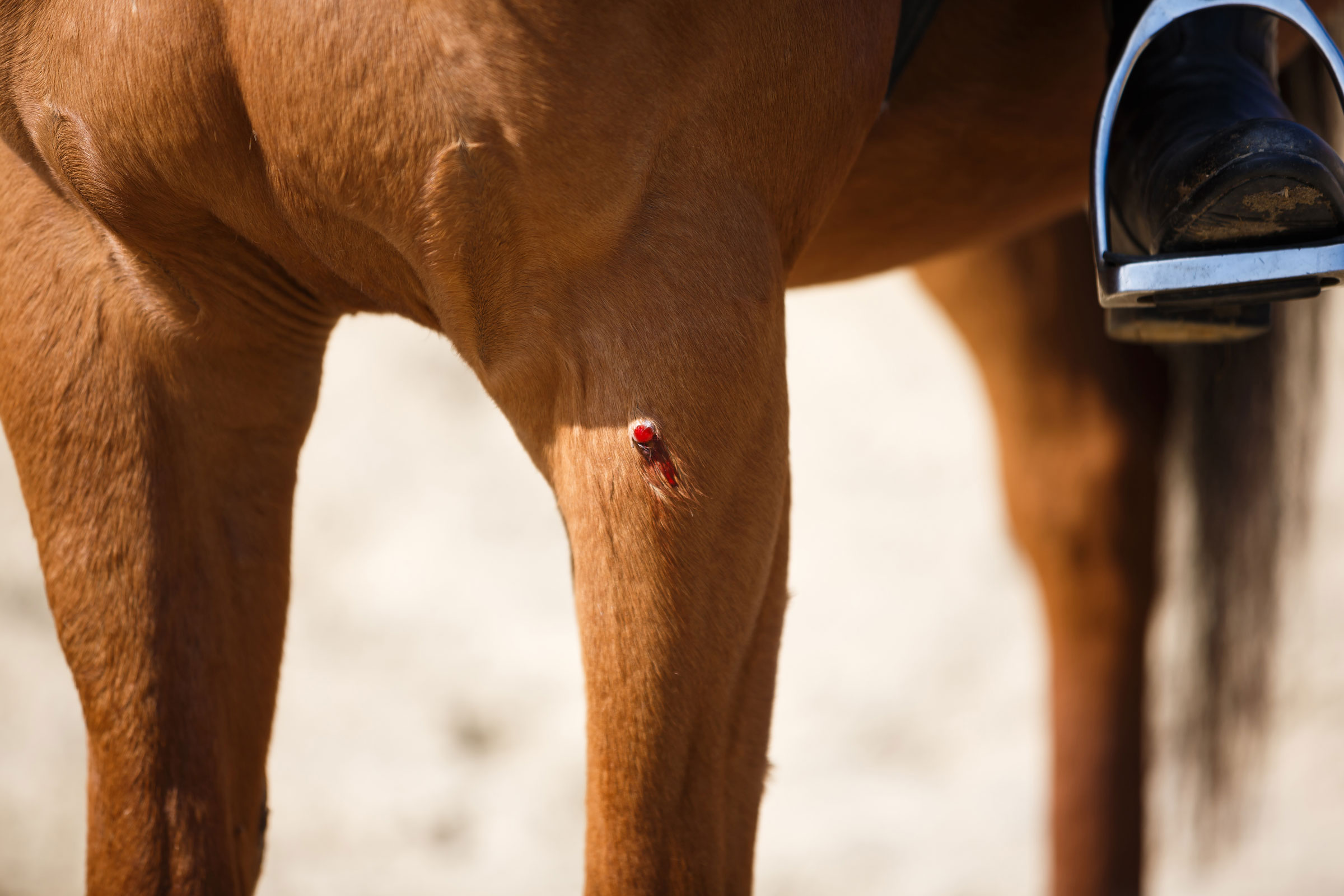
Tetanus is another core horse vaccine that is recommended by the American Association of Equine Practitioners (AAEP). These core vaccines are annual vaccines that protect against diseases that are highly contagious/infectious and have a high mortality rate in horses.
Links in articles are part of an Amazon Affiliate program that provides income to support this brand. Links are chosen by our editors.
The following are the other core vaccines for horses:
- Eastern and Western equine encephalitis (EEE and WEE)
- West Nile virus (WNV)
- Rabies
Clostridium tetani bacteria form spores that reside in the soil, the intestinal tract and in feces. Cl. tetani spores can enter any open wound, incision, the umbilicus of foals, and even the retained placenta from a postpartum mare. Once the spores enter a wound (even the smallest, seemingly most insignificant puncture), they proliferate and excrete a neurotoxin to cause tetanus signs. Tetanus in horses has a death rate of 50-75%, but this disease is not contagious between horses.
Equine business owners can create an Amazon Business Account.
Tetanus toxin travels through the nerves to the central nervous system to cause an affected horse’s muscles to continuously contract and spasm. The horse assumes a classic sawhorse stance (the front and rear legs stretched out) and the third eyelid prolapses across the eye, particularly if the horse is stimulated in any way.
A horse with tetanus is hypersensitive to stimuli such as sound and touch. The affected horse’s face develops a particular expression with ears erect and pointing rearward, nostrils flared, and the lip muscles pull back to expose the teeth into what is referred to as a sardonic grin.
Tetanus is also referred to as lockjaw because of the rigidity of the horse’s jaw muscles and that it causes difficulty in swallowing that prevents the horse from eating or drinking.
Vaccination is recommended annually for horses due to the abundance of spores in the environmental soil and manure.
Clostridium tetani spores can survive many years, therefore should be considered always present.
If a horse gets a wound—especially a puncture wound—be sure to check its tetanus vaccination status and boost if necessary. Any horse undergoing surgery should also be up-to-date on tetanus immunization.
Tetanus Vaccination Schedules
The following is provided by the AAEP.
Tetanus antitoxin is indicated to provide passive immunity in situations where the horse is at risk of tetanus infection and has not been immunized according to labeled recommendations for tetanus. If the veterinarian determines that administration of tetanus antitoxin is indicated, then it should be administered in one site and the initial dose of a priming series of tetanus toxoid vaccinations should be administered at a distant muscular site. The rare, but fatal, risk of Theiler’s disease consequent to the use of tetanus antitoxin needs to be taken into consideration when determining if use is indicated.
Adult horses, previously vaccinated against tetanus: Vaccinate annually. Horses that sustain a wound or undergo surgery 6 or more months after their previous tetanus booster should be revaccinated with tetanus toxoid immediately at the time of injury or surgery. Note: The severity of the wound does not predict the risk for development of tetanus. Superficial wounds have resulted in clinical tetanus in horses.
Adult horses, previously unvaccinated against tetanus, or of unknown vaccinal history: Administer a primary 2-dose series of tetanus toxoid with a 4- to 6-week interval between doses. Protective concentrations of immunoglobulin are usually attained within 14 days of the second dose of vaccine. Vaccinate annually thereafter.
Pregnant mares previously vaccinated against tetanus: Vaccinate annually 4 to 6 weeks before foaling, both to protect the mare should foaling-induced trauma or retained placenta occur and to enhance concentrations of colostral immunoglobulins.
Pregnant mares unvaccinated against tetanus or of unknown vaccinal history: Administer a 2-dose primary series of tetanus toxoid with a 4- to 6-week interval between doses. Revaccinate 4 to 6 weeks before foaling.
Foals of mares vaccinated against tetanus in the pre-partum period: Administer a primary 3-dose series of tetanus toxoid beginning at 4 to 6 months of age. A 4- to 6-week interval between the first and second doses is recommended. The third dose should be administered at 10 to 12 months of age.
Foals of unvaccinated mares or mares of unknown vaccinal history: Administer a primary 3-dose series of toxoid beginning at 3-4 months of age. A 4- to 6-week interval between the first and second doses is recommended. The third dose should be administered at 10 to 12 months of age. Serologic data indicates that a 3-dose initial series produces a more consistent anamnestic response in all foals, regardless of the age at which the series is initiated. Tetanus antitoxin is indicated to provide passive immunity in situations where a foal is born to a non-vaccinated mare and is at risk of tetanus infection. (See Tetanus antitoxin above.)
Horses having been naturally infected with tetanus and recovered: Revaccinate annually.
Sign up now for Amazon Prime 30-day Free Trials, a membership program that offers special benefits including: Instantly watch thousands of movies and TV episodes; Borrow Kindle books; Get unlimited FREE two-day shipping (no minimum order size). Learn more.


